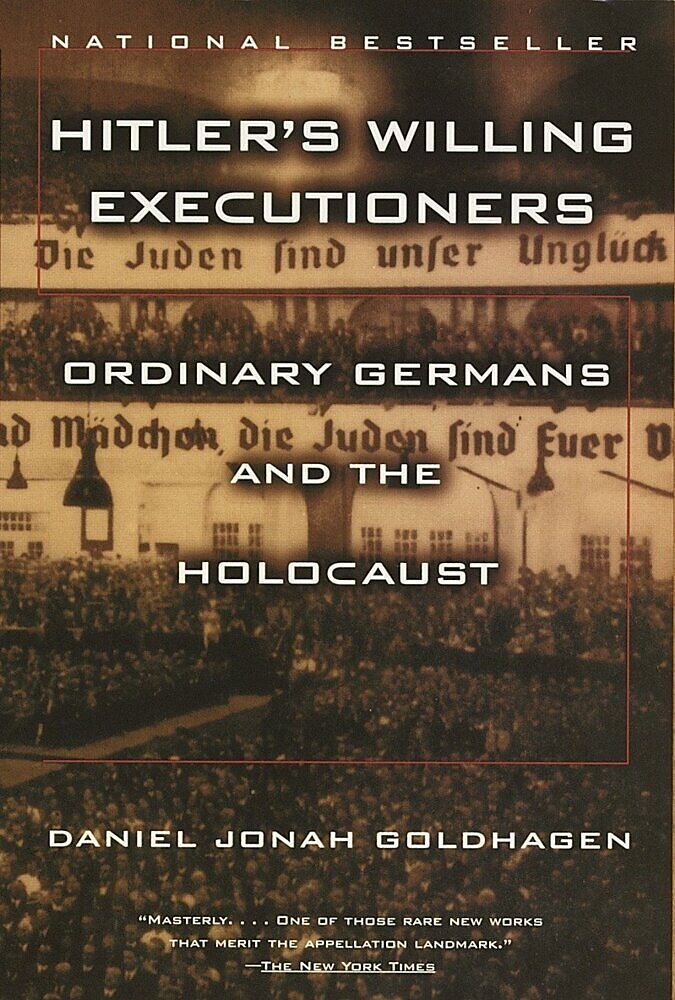Hitler's Willing Executioners
Einband:
Kartonierter Einband
EAN:
9780679772682
Untertitel:
Ordinary Germans and the Holocaust
Autor:
Daniel Jonah Goldhagen
Herausgeber:
Random House LLC US
Anzahl Seiten:
634
Erscheinungsdatum:
28.02.1997
ISBN:
0679772685
Informationen zum Autor Daniel Jonah Goldhagen is an Associate of Harvard University's Minda de Gunzburg Center for European Studies. His doctoral dissertation, which is the basis for the book, was awarded the American Political Science Association's 1994 Gabriel A. Almond Award for the best dissertation in the field of comparative politics. After publication of this book in Germany, in 1997 Daniel Johan Goldhagen won the highly prestigious Democracy Prize. He is the author of A Moral Reckoning: The Role of the Catholic Church in the Holocaust and Its Unfulfilled Duty of Repair . Klappentext This groundbreaking international bestseller lays to rest many myths about the Holocaust: that Germans were ignorant of the mass destruction of Jews, that the killers were all SS men, and that those who slaughtered Jews did so reluctantly. Hitler's Willing Executioners provides conclusive evidence that the extermination of European Jewry engaged the energies and enthusiasm of tens of thousands of ordinary Germans. Goldhagen reconstructs the climate of "eliminationist anti-Semitism" that made Hitler's pursuit of his genocidal goals possible and the radical persecution of the Jews during the 1930s popular. Drawing on a wealth of unused archival materials, principally the testimony of the killers themselves, Goldhagen takes us into the killing fields where Germans voluntarily hunted Jews like animals, tortured them wantonly, and then posed cheerfully for snapshots with their victims. From mobile killing units, to the camps, to the death marches, Goldhagen shows how ordinary Germans, nurtured in a society where Jews were seen as unalterable evil and dangerous, willingly followed their beliefs to their logical conclusion. " Hitler's Willing Executioner's is an original, indeed brilliant contribution to the...literature on the Holocaust."--New York Review of Books "The most important book ever published about the Holocaust...Eloquently written, meticulously documented, impassioned...A model of moral and scholarly integrity."--Philadelphia Inquirer Leseprobe 1 RECASTING THE VIEW OF ANTISEMITISM: A FRAMEWORK FOR ANALYSIS In thinking about German antisemitism, people have a tendency to make important, unacknowledged assumptions about Germans before and during the Nazi period that bear scrutiny and revision. The assumptions are ones that people would not adopt for investigating a preliterate group in Asia or fourteenth-century Germans, yet which they do for the study of nineteenth- and twentieth-century Germany. They can be summed up as follows: Germans were more or less like us or, rather, similar to how we represent ourselves to be: rational, sober children of the Enlightenment, who are not governed by "magical thinking," but rooted in "objective reality." They, like us, were "economic men" who, admittedly, sometimes could be moved by irrational motives, by hatreds, produced by economic frustrations or by some of the enduring human vices like the lust for power or pride. But these are all understandable; as common sources of irrationality, they seem commonsensical to us. There are reasons to doubt the validity of such assumptions, as an American educator intimately familiar with Nazi schools and youth cautioned in 1941. Nazi schooling, he averred, "produced a generation of human beings in Nazi Germany so different from normal American youth that mere academic comparison seems inane and any sort of evaluation of the Nazi educational system is extremely difficult." So what justifies the prevailing assumptions about the similarity between us and Germans during the Nazi period and before? Should we not take a fresh look and examine whether or not our notions of ourselves held for Germans in 1890, 1925, and 1941? We readily accept that preliterate peoples have believed trees to be animated by good and evil spirits, capable of transforming the material world...
Autorentext
Daniel Jonah Goldhagen is an Associate of Harvard University's Minda de Gunzburg Center for European Studies. His doctoral dissertation, which is the basis for the book, was awarded the American Political Science Association's 1994 Gabriel A. Almond Award for the best dissertation in the field of comparative politics. After publication of this book in Germany, in 1997 Daniel Johan Goldhagen won the highly prestigious Democracy Prize. He is the author of A Moral Reckoning: The Role of the Catholic Church in the Holocaust and Its Unfulfilled Duty of Repair.
Klappentext
This groundbreaking international bestseller lays to rest many myths about the Holocaust: that Germans were ignorant of the mass destruction of Jews, that the killers were all SS men, and that those who slaughtered Jews did so reluctantly. Hitler's Willing Executioners provides conclusive evidence that the extermination of European Jewry engaged the energies and enthusiasm of tens of thousands of ordinary Germans. Goldhagen reconstructs the climate of "eliminationist anti-Semitism" that made Hitler's pursuit of his genocidal goals possible and the radical persecution of the Jews during the 1930s popular. Drawing on a wealth of unused archival materials, principally the testimony of the killers themselves, Goldhagen takes us into the killing fields where Germans voluntarily hunted Jews like animals, tortured them wantonly, and then posed cheerfully for snapshots with their victims. From mobile killing units, to the camps, to the death marches, Goldhagen shows how ordinary Germans, nurtured in a society where Jews were seen as unalterable evil and dangerous, willingly followed their beliefs to their logical conclusion.
"Hitler's Willing Executioner's is an original, indeed brilliant contribution to the...literature on the Holocaust."--New York Review of Books
"The most important book ever published about the Holocaust...Eloquently written, meticulously documented, impassioned...A model of moral and scholarly integrity."--Philadelphia Inquirer
Leseprobe
1
RECASTING THE VIEW OF ANTISEMITISM: A FRAMEWORK FOR ANALYSIS
In thinking about German antisemitism, people have a tendency to make important, unacknowledged assumptions about Germans before and during the Nazi period that bear scrutiny and revision. The assumptions are ones that people would not adopt for investigating a preliterate group in Asia or fourteenth-century Germans, yet which they do for the study of nineteenth- and twentieth-century Germany. They can be summed up as follows: Germans were more or less like us or, rather, similar to how we represent ourselves to be: rational, sober children of the Enlightenment, who are not governed by "magical thinking," but rooted in "objective reality." They, like us, were "economic men" who, admittedly, sometimes could be moved by irrational motives, by hatreds, produced by economic frustrations or by some of the enduring human vices like the lust for power or pride. But these are all understandable; as common sources of irrationality, they seem commonsensical to us.
There are reasons to doubt the validity of such assumptions, as an American educator intimately familiar with Nazi schools and youth cautioned in 1941. Nazi schooling, he averred, "produced a generation of human beings in Nazi Germany so different from normal American youth that mere academic comparison seems inane and any sort of evaluation of the Nazi educational system is extremely difficult." So what justifies the prevailing assumptions about the similarity between us and Germans during the Nazi period and before? Should we not take a fresh look and examine whether or not our notions of ourselves held for Germans in 1890, 1925, and 1941? We readily accept that preliterate peoples have believed trees to be animated by good and evil spirits, capable of transforming the material world, that the Aztecs believed human sacrifices were necessary for the s…

Leider konnten wir für diesen Artikel keine Preise ermitteln ...
billigbuch.ch sucht jetzt für Sie die besten Angebote ...
Die aktuellen Verkaufspreise von 6 Onlineshops werden in Realtime abgefragt.
Sie können das gewünschte Produkt anschliessend direkt beim Anbieter Ihrer Wahl bestellen.
Loading...
Die aktuellen Verkaufspreise von 6 Onlineshops werden in Realtime abgefragt.
Sie können das gewünschte Produkt anschliessend direkt beim Anbieter Ihrer Wahl bestellen.
| # | Onlineshop | Preis CHF | Versand CHF | Total CHF | ||
|---|---|---|---|---|---|---|
| 1 | Seller | 0.00 | 0.00 | 0.00 |
